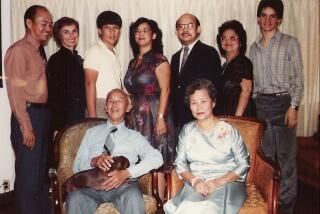Woman, 70, to Battle Eviction : Says She and Late Husband Were Promised Cottage; Heir Denies It
Before Michael Corrigan died last July 10, he and his wife, Rose, believed that she would have the San Juan Capistrano house in which they lived and a $12,000 annuity left to him by his longtime employer, the late multimillionaire Robert Honeyman.
Instead, Rose Corrigan and her 37-year-old daughter, Melody, were hit with a 30-day notice by the heir to the Honeyman estate in November, ordering them to vacate the house. The Honeymans’ son contends that Rose Corrigan is not entitled to the house or any benefits that she claims were codified in a 1968 will.
She’ll Stay and Fight
Rose Corrigan has decided to stay and fight for the 3-bedroom cottage she has called home for the last 41 years. After all, she said, she and her husband spent 47 years of their lives working for the Honeymans, adding that they were owed at least that much.
“I came to Capistrano when there were only 800 people here, before the I-5 was installed,” Rose Corrigan said. “My husband served these people his entire life and they made a promise to him.”
In 1968, Rose Corrigan said, she witnessed the signing of a will that said that if her husband was still working for Honeyman when the latter died, Michael Corrigan would receive an annuity of $12,000 and Honeyman’s estate would purchase a house of comparable value to the one in which the Corrigans lived on the Honeyman estate, Los Cerritos Ranch.
When Michael Corrigan died last July, he had outlived Honeyman, who died in June, 1987, and his wife, Marian, who died July 9, 1988. At the time of Michael Corrigan’s death, he still was technically employed by the couple.
“If they didn’t intend to keep that promise, they never should have made it,” said Rose Corrigan, who will turn 70 in February. “What am I supposed to think--that I’m not entitled to the house?”
However, Stevens Weller, attorney for Robert Honeyman Jr., heir to the Honeyman estate, said there was never any agreement or promise made that included the house.
Says House Not Provided
“Mr. Honeyman provided in his trust that there’d be an annuity for $12,000 a year for life, but there was nothing to do with the house,” Weller said. The attorney said the senior Honeyman had provided those annuities for Michael Corrigan and another employee, whom he did not identify.
Weller said that since Michael Corrigan died, the annuity payment is void.
As for the provision about the house, Weller said: “We looked through the old documents and found nothing. Nobody in the family has ever heard of it being in the trust. Mrs. Honeyman, before she died, said that she had never heard of any agreement.”
According to Robert Pearson, Rose Corrigan’s attorney, Honeyman transferred the will to a trust--a document that is less binding than a will--after some years. A trust made in 1982 deleted the section of the house, Pearson said, without the Corrigans’ knowledge.
Pearson requested a copy of the 1982 trust, as well as any previous trusts and amendments made. However, only the 1982 trust was provided by Weller. Any other documents, Pearson was told, were confidential.
But Weller said: “Anything about his client was sent to him and we couldn’t find anything else. We sent him copies of everything the family could find.”
Called a Personal Matter
For Rose Corrigan, it is more a personal matter than a legal one.
“I never thought they’d do this to Mike,” said the New York City native. “He gave his entire life to this house and to them; my whole family did.”
Michael Corrigan was first hired in Pasadena as a chauffeur for the Honeymans in 1941. Rose Corrigan worked for three years as chauffeur and traveled with the couple, while her husband served in World War II. The Honeymans wanted to keep the position open for him when he returned, she said.
The couple moved to San Juan Capistrano in 1947, where the cottage was built for them to live, Rose Corrigan said. Michael Corrigan was promoted to gardener and caretaker and Rose Corrigan worked as housekeeper and personal assistant to Honeyman’s wife.
“People used to say we got a house for nothing, but we paid for this house,” Rose Corrigan said. “It was a long time between pay raises. And everything they wanted, we did. Mr. and Mrs. Beckon Call, that’s what we became.”
Every inch of Rose Corrigan’s weathered pale yellow house is covered with memorabilia and trinkets that her family has collected over the years. She and her husband raised their three children--Michael, Marsha and Melody--there. Pictures of them and other relatives adorn living room and bedroom walls. Scrapbooks and photo albums are stacked against a living room wall and boxes of grandchildren’s toys clutter the corner of the porch. A rusty, 35-year-old bicycle that Honeyman gave to her son, Michael, still rests against the carport.
40 Years of Memories
It is 40 years of memories and junk, Rose Corrigan said. And how do you move that, she asked?
Her lack of money also poses a problem if she is forced to move.
“I have nothing to lose, because I have nothing,” Rose Corrigan said. “The little savings I have, I might as well go for broke. And $800 a month in Social Security doesn’t go far.
“We never made enough money to save in order to buy a house or anything,” she said. Michael Corrigan made $500 a month, while Rose Corrigan was paid about $5 an hour toward the end of her time with the Honeymans.
“(The house) means so little to them,” she said of the heir to the estate. “I mean, we’re talking petty cash to these people. These are multimillionaires.”
The late Robert Honeyman’s wife, Marian Stewart, was the sole heir to Stewart-Warner, the company that bought the invention of the speedometer, Rose Corrigan said. Honeyman, himself, was the sole heir to stock in the Bethlehem Coal Co.
A former housekeeper and cook of the Honeymans, who asked to remain anonymous, said that several employees knew Michael and Rose Corrigan were promised the house when Honeyman died.
“When we heard that this had happened, we were sick,” the 52-year-old Los Angeles woman said of her and her husband’s reactions. She said that she and her husband worked for the Honeymans in the early 1980s.
“Mike was a loyal employee,” the former employee said. “He would do anything Mr. Honeyman wanted him to do. To be put in this position in your 70s is just terrible.”
“These are not poor people,” the woman continued. “If they cannot provide for this 70-year-old woman, then it just shows their shallowness; it’s despicable.”
But Rose Corrigan is not giving up.
“I’m not leaving my home,” she said in a determined voice. “I want what they promised my husband, and I don’t want anything Mickey Mouse-ish.
“I’ll do what it takes,” Rose Corrigan vowed. “I owe that to my husband.”
More to Read
Sign up for Essential California
The most important California stories and recommendations in your inbox every morning.
You may occasionally receive promotional content from the Los Angeles Times.










